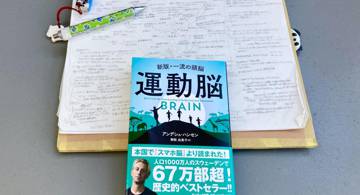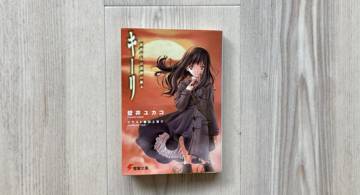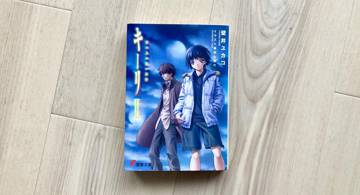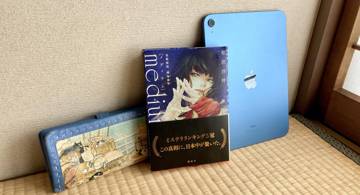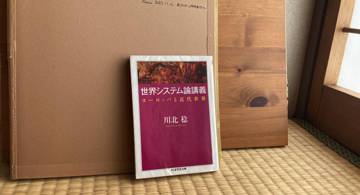Overview
Ah, it's so nostalgic!
"Kidnap Kidding" is the latest installment in Nisio Isin's Zaregoto Series. It was released this month, in February 2023. The Zaregoto Series was published from 2002 to 2005, so this is a new work after 18 years.
"Risuka 4" is the latest installment in the Risuka Series. I didn't notice, but it seems it was released in 2020. The Risuka Series was published from 2004 to 2007, and it was actually an unfinished series. So, it has been concluded after a 13-year gap.
Both books have had a long time since the release of their previous volumes. In particular, "Risuka" has been unfinished for over 10 years. For us longtime readers, it was a masterpiece that was discontinued. I really didn't know it had been concluded in 2020... For me, Nisio Isin's works have already been stored away in my memory box as "books I loved as a child," and I haven't been getting any recent information about them.

I'll write a summary and some impressions. Spoilers ahead.
Summary of "Kidnap Kidding"
- The protagonist is Jun-chan, the daughter of "that" Ii-chan and "that" Tomo-chan.
- During the summer vacation, Jun-chan, who was about to return home, gets kidnapped by Jun Ayukawa.
- The kidnapping destination is Tomo-chan's family home, Kuganu Castle.
- The reason for the kidnapping is that Kuganu's grandfather wants Jun-chan to repair an artificial satellite.
- Jun-chan is really struggling with this impossible task, but then a beheading murder case occurs.
- Jun-chan solves the case.
- Somehow, she also manages to escape from Kuganu Castle.
Summary of "Risuka 4"
- At the end of the previous volume, Kizutaka-kun had defeated the dream-manipulating magician, but when he woke up, he was crucified by the stake magician and in a desperate situation.
- Yes, that's right. We, the readers, were left hanging in that state for 10 years.
- Kizutaka-kun and Risuka-chan defeat the stake magician using a waiting strategy.
- At the same time, Risuka-chan levels up and evolves into a magician who can jump to the past and future.
- With this momentum, they defeat the mid-boss Okappa Key-chan, but by defeating Key-chan, who has the role of a "key," the final boss, Mizukura Shinri, is born from Risuka-chan's womb. Its appearance is a baby several tens of meters tall.
- The final boss, Mizukura Shinri, activates the continental drift magic, which is its true desire.
- Our Kizutaka-kun is helplessly thrown into the sea, but he stabs the heart of Risuka-chan inside his own body. Risuka-chan, who has spread throughout the sea, fights the final boss, Mizukura Shinri, and seems to have won.
Impressions
I quite enjoyed "Kidnap Kidding". Jun-chan's character, who can both set up and deliver punchlines, really matched my taste, and the mystery-solving part was exciting. The part about the artificial satellite was unexpected, and it reminded me of the good old times.
"Risuka 4" was moderately enjoyable. I wanted to see Kizutaka-kun being as cool as he was in the previous volumes. This time, Kizutaka-kun was quite beaten up. The revelation that Key-chan was the reincarnation of the fourth mother was incomprehensible, the logic of Key-chan's death leading to pregnancy was unclear, and the scene where Risuka-chan's blood spread in the sea and fought the final boss was also confusing. But, well, there's no need to understand everything in the story, and it was nice to see Kizutaka-kun growing up and working hard.
"No, I don't need that anymore." "There's no point in insisting on it." These were great lines.
"The ten-year-old me would have fainted if he heard this." "This (my own) terrible intuition." These were also great lines.
This is one of the places where I used to live, a rural area like a wasteland. I used to play a game where I would walk along this embankment and read an entire book (I thought it was cool to balance exercise and reading), and the Risuka Series was one of those books.
Words I Learned
- Probability: The ratio of certainty that something can happen.
- Namanaka: Half-hearted. Can be written as "raw middle," but it's not beer.
- Manimani: Written as "at will." Acting according to other people's or situations' whims.
- Tarachine: Mother. Ah, I remember hearing this in classical Japanese class.
- Burnt by soup, blow on sushi: After burning your mouth on hot soup (cooked dish), you blow on cold sushi. It means doing unnecessary and excessive worrying.
- Red Herring: A herring that has been pickled in heavily salted water and turned bright red. I don't know why it turns red. As an idiom, it represents something that distracts attention. Apparently, it was used in dog training, which is the origin of the phrase.
- Nijo Castle: A castle in Kyoto. It's a World Cultural Heritage site.
- Establishing friendship: Kougi is an intimate relationship. So, it means establishing a friendly relationship.
- Both sophistry and ointment stick anywhere: If you try, you can justify anything. At first, I thought the ointment was a topical medicine, but it's not. It refers to a combination of ointments, hard plasters, and adhesive plasters. Poultices seem to be different.
- Datsu-eba: Yama's wife. She weighs the sins of the deceased before Yama judges them. Specifically, she undresses the dead, hangs their clothes on a tree called Eriyouju by her buddy Ken-e-o, and weighs the sins based on how much the branches bend. The weight of the clothes is proportional to the weight of the sins. Why is the weight of the clothes equal to the weight of the sins? ...I guess they're on the other side of the Sanzu River? Sinners have to walk across the river (I think), so their clothes would be wet and heavy.
- Niko-mo: Written as Wamo. It means downy hair.
- Moe-cut: A beautiful cross-section after cutting a sandwich or something similar.
- Third course: One of the traditional Japanese Honzen dishes. It seems to carry soup and sashimi. So, it's a dish for holding other dishes?
- One or two days: Means 1 or 2 days. Whether the day of the statement is included in the 1 or 2 days depends on the situation. Such ambiguous Japanese is hard to use.
- Excelsior: I don't know.
- Diffraction: (Physically) the bending of waves around obstacles. ...It seems to be used incorrectly in the text.
- Disappearance: It means being missing. The proper usage is "to disappear." The character "逐" means to drive away, as in "to chase away."
- Honeycomb structure: It refers to a structure of regular hexagonal prisms arranged together.
- The Inugami Family, Yatsuhaka Village: Both novels by Seishi Yokomizo. They're quite famous, so I'd like to read them someday.
- Illegitimate child: A child born out of wedlock.
- Anne Books: The Anne of Green Gables series.
- Page-turner: A book that makes you want to read the next part quickly.
- Tomare Kakumare: A variation of the phrase "anyway, one way or another."

